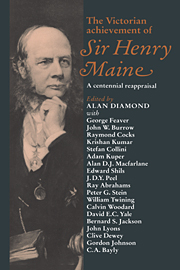Book contents
- Frontmatter
- Contents
- Notes on contributors
- Foreword by Sir John Lyons
- Introduction
- 1 The Victorian values of Sir Henry Maine
- PART 1 MAINE AND THE IDEA OF PROGRESS
- PART 2 MAINE AND THE SOCIAL SCIENCES
- 6 The rise and fall of Maine's patriarchal society
- 7 Some contributions of Maine to history and anthropology
- 8 Henry Sumner Maine in the tradition of the analysis of society
- 9 Maine as an ancestor of the social sciences
- 10 Ancient Law and modern field work
- PART 3 MAINE ON LAW, LEGAL CHANGE AND LEGAL EDUCATION
- PART 4 MAINE AND INDIA
- Appendix: the conference programme
- Bibliography
- Index
8 - Henry Sumner Maine in the tradition of the analysis of society
Published online by Cambridge University Press: 04 September 2009
- Frontmatter
- Contents
- Notes on contributors
- Foreword by Sir John Lyons
- Introduction
- 1 The Victorian values of Sir Henry Maine
- PART 1 MAINE AND THE IDEA OF PROGRESS
- PART 2 MAINE AND THE SOCIAL SCIENCES
- 6 The rise and fall of Maine's patriarchal society
- 7 Some contributions of Maine to history and anthropology
- 8 Henry Sumner Maine in the tradition of the analysis of society
- 9 Maine as an ancestor of the social sciences
- 10 Ancient Law and modern field work
- PART 3 MAINE ON LAW, LEGAL CHANGE AND LEGAL EDUCATION
- PART 4 MAINE AND INDIA
- Appendix: the conference programme
- Bibliography
- Index
Summary
In the past quarter of a century, the academic study of sociology has been given several adoptive ancestors. Karl Marx and Alexis de Tocqueville have been retroactively installed into the ancestry of sociology; they are now thought of as having always been there. They are now regarded as the forefathers of sociology although, in fact, until relatively recently, neither of them was regarded by practising sociologists as a sociologist or even as a proto-sociologist.
There is nothing at all wrong with bringing into an intellectual tradition authors and ideas previously disregarded; it is perfectly reasonable to assimilate into a tradition patterns of thought or propositions which have long been neglected or not previously been regarded as parts of a particular tradition. Intellectual disciplines often benefit from drawing into themselves traditions hitherto remote from them. When this happens, it is perfectly reasonable that the scholars who generated or sustained the newly assimilated tradition should take their place in the ancestral pantheon. When they do so, however, a false view of the historical development of the tradition is suggested.
There are other sources of distortion of the image of the historical form of a tradition. An ancestor — a chronologically genuine ancestor — might be forgotten, so that only his descendants are prominent. The remoter ancestor who formed those prominent descendants has been diminished in the memory of later generations.
This is the situation of Henry Sumner Maine in the tradition of the study of society.
- Type
- Chapter
- Information
- The Victorian Achievement of Sir Henry MaineA Centennial Reappraisal, pp. 143 - 178Publisher: Cambridge University PressPrint publication year: 1991
- 1
- Cited by

